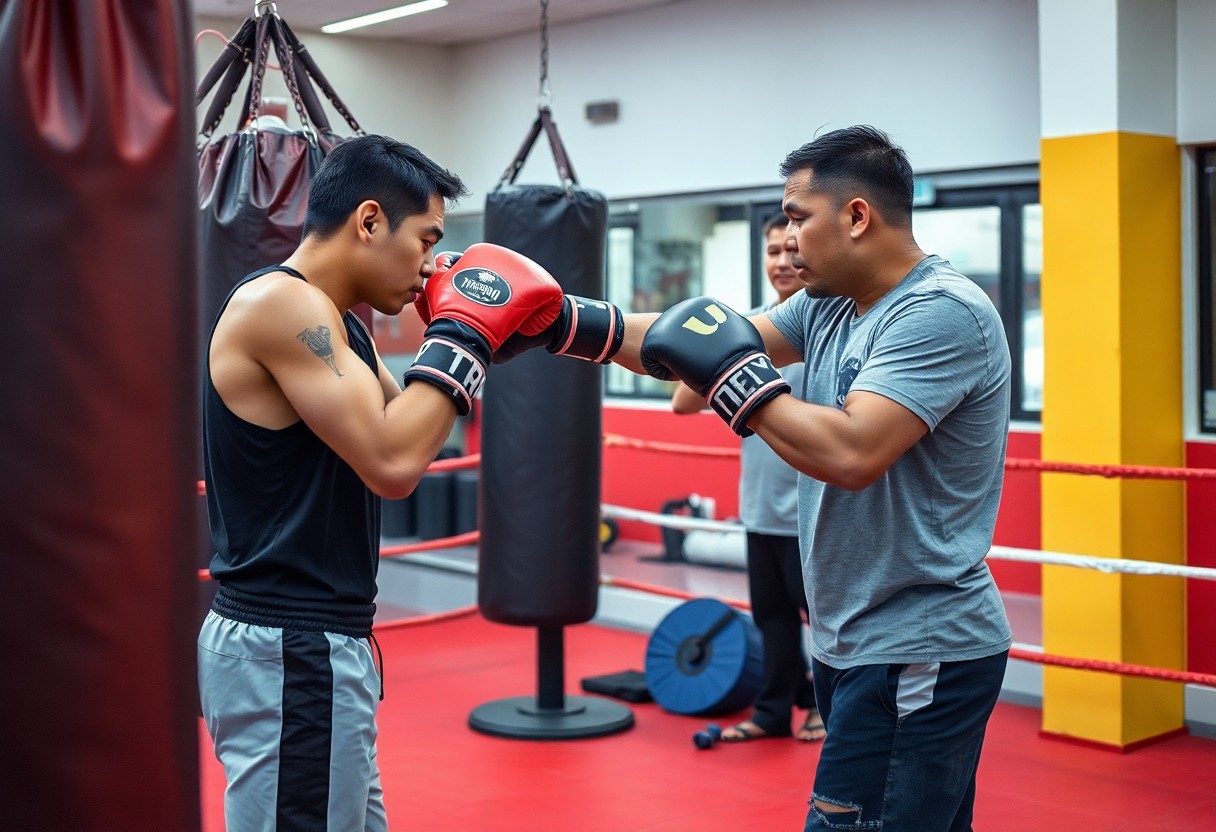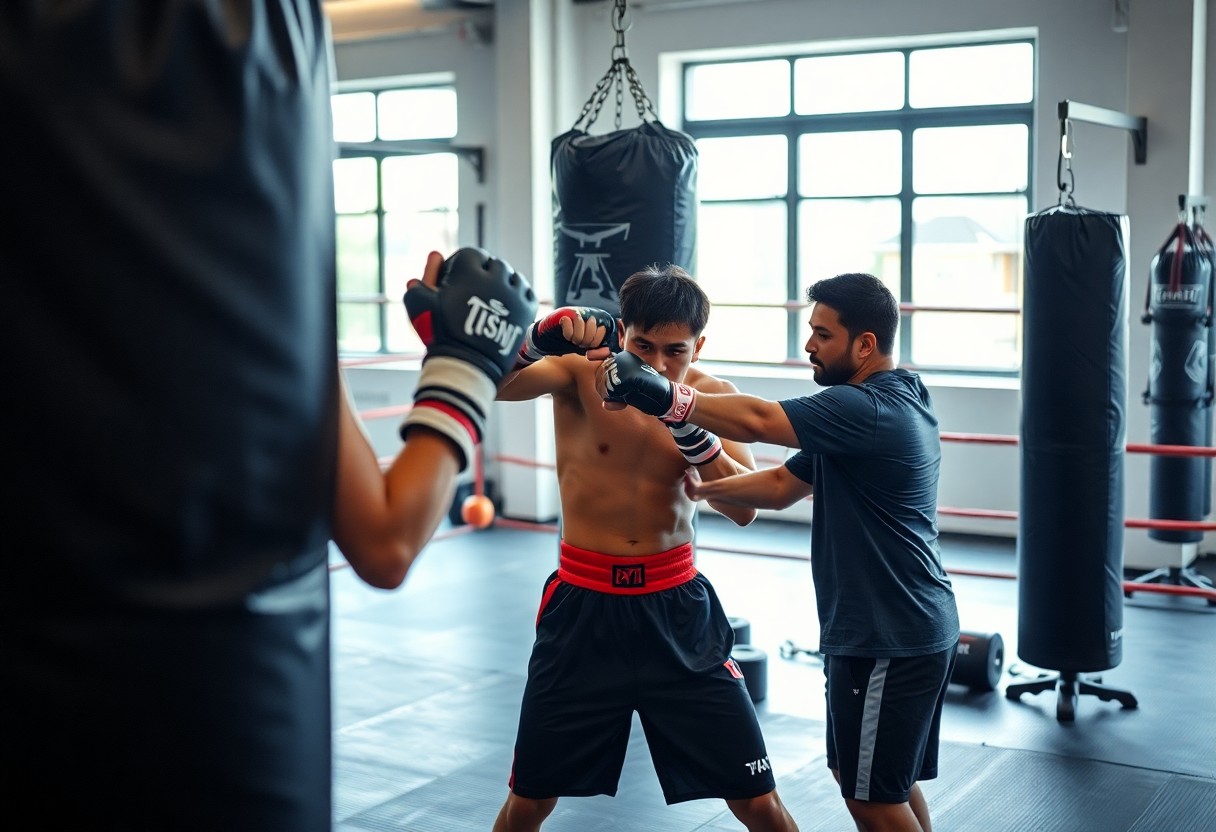
This guide offers necessary training tips that will help you elevate your skills in Muay Thai. Whether you are a beginner or looking to refine your technique, understanding the fundamentals and practicing consistently is key. You will learn effective strategies for improving your footwork, striking, and conditioning, as well as insights on how to stay motivated and track your progress. With dedication and the right approach, you can take your Thai boxing journey to new heights.
Understanding the Basics
As an aspiring Thai boxer, grasping the fundamental principles of the sport is crucial for your training. Familiarizing yourself with the unique components of Muay Thai, such as the eight-point striking system, will set a strong foundation for your skills and techniques. Embrace these basics and allow them to guide your journey through the art of Thai boxing.
How to Learn Thai Boxing Techniques
The key to mastering Thai boxing techniques lies in consistent practice and observation. Start by attending classes with a qualified instructor who can provide feedback and guidance. Supplement your training with online tutorials and instructional videos that demonstrate proper techniques. Focus on perfecting one technique at a time to build muscle memory and enhance your overall performance.
Tips for Developing Footwork
The importance of effective footwork in Thai boxing cannot be overstated. To improve your agility and balance, engage in drills that emphasize quick lateral movements. Here are some helpful tips to consider:
- Practice shadowboxing to refine your footwork.
- Incorporate agility drills like ladder exercises into your routine.
- Work on pivoting and angling to evade strikes.
Any consistent effort you put into footwork will significantly enhance your overall performance in the ring.
Another effective way to develop your footwork is by sparring regularly with partners of varying skill levels. This will not only challenge your mobility but also help you adapt to different fighting styles. Here are some additional approaches to consider:
- Use cones or markers to create movement patterns during drills.
- Incorporate skipping rope into your fitness routine for improved coordination.
- Analyze your footwork during sparring sessions to identify areas for improvement.
Any dedication to honing your footwork will undoubtedly lead to increased versatility and confidence in your fighting abilities.
Essential Training Tips
You can significantly enhance your Thai boxing skills by following these important training tips:
- Focus on technique over strength.
- Incorporate shadowboxing into your routine.
- Practice combinations regularly.
- Engage in partner drills to simulate real fights.
- Maintain a balanced diet for optimal performance.
Knowing these tips will set you on the right path to becoming a skilled Thai boxer.
How to Build Stamina and Endurance
For optimal performance in the ring, building stamina and endurance is important. Incorporate high-intensity interval training (HIIT) into your workouts, which will significantly improve your cardiovascular health. Activities such as running, cycling, and skipping rope can also help increase your stamina. Consistency is key, so aim to incorporate these workouts into your training regimen several times a week.
Tips for Strength Training
Some effective strategies for strength training in Thai boxing include:
- Prioritize compound movements like squats and deadlifts.
- Incorporate bodyweight exercises to build functional strength.
- Use resistance bands for added resistance.
- Focus on explosive power training.
- Include core-strengthening exercises for better stability.
This balanced approach will enhance your overall power and improve your performance in the ring.
Build strength effectively by integrating these exercises into your routine:
- Perform sets of 8-12 reps for hypertrophy.
- Utilize supersets to increase intensity.
- Allow for adequate recovery between training sessions.
- Track your progress to stay motivated.
This structured regimen will not only increase your strength but also complement your technical skills in Thai boxing.
Sparring and Application
Now that you’ve built a foundation in your techniques, sparring provides an opportunity to apply them in a controlled environment. Engaging in sparring sessions allows you to gauge your skills against a live opponent, refining your technique, timing, and strategy. Focus on implementing what you’ve learned in training while being adaptable to your partner’s movements. Always prioritize safety by working with a partner who matches your skill level and gives constructive feedback.
How to Spar Effectively
Now, to spar effectively, approach your sessions with a clear mindset. Begin by setting specific goals for each sparring round, whether that’s focusing on defending against strikes or landing particular techniques. Keep a relaxed demeanor, as tension can hinder your performance. Communicate with your partner about the intensity of the sparring, allowing both of you to adjust your approach during the session.
Tips for Using Techniques in Real Matches
You can significantly enhance your performance by integrating the techniques you’ve practiced into your sparring and matches. Start by rehearsing the specific techniques you want to use during sparring sessions, and gradually incorporate them into more competitive situations. Focus on the following strategies to maximize your effectiveness:
- Practice adapting your techniques based on your opponent’s style.
- Devote time to drilling combinations that flow naturally into one another.
- Stay mindful of your position and footwork to create openings for strikes.
- Utilize visualization techniques to reinforce your game plan before stepping into the ring.
This approach helps build confidence, as you become more accustomed to executing your skills under pressure.
Sparring is not just about trying to win; it also serves as a learning tool to implement your techniques successfully. Focus on testing your skills as if it were a real match, allowing you to gauge your readiness. Practicing these points can enhance your adaptability:
- Evaluate the effectiveness of your techniques after each round.
- Speak with experienced fighters to gain insight on your execution.
- Analyze your sparring sessions, noting areas for improvement.
- Reflect on what techniques proved effective against different opponents.
This self-reflection is key to continual progress in your Thai boxing journey.
Mental Preparation
Keep in mind that mental preparation is as important as physical training. A strong mindset will not only enhance your performance but also enable you to overcome challenges and push through barriers. Taking the time to mentally prepare yourself will make you a more resilient and focused fighter.
How to Stay Focused During Training
Preparation is key to maintaining focus during your training sessions. Set specific goals for each workout and visualize achieving each one. Create an environment that minimizes distractions and consider using techniques such as mindfulness or meditation to sharpen your concentration.
Tips for Developing a Winning Mindset
Developing a winning mindset requires dedication and self-reflection. Focus on the following strategies to foster this mentality:
- Establish clear, achievable goals
- Embrace challenges as opportunities for growth
- Visualize success in your fights
- Surround yourself with positive influences
Any consistent effort in practicing these tips will help shape your mental approach to Thai boxing.
A strong mindset not only enhances your performance but also helps you handle the inevitable setbacks and pressure of the sport. To build upon your winning mindset, consider these additional strategies:
- Maintain a positive self-talk
- Reflect on past successes to boost confidence
- Stay persistent and committed to improvement
- Practice gratitude to maintain perspective
Any proactive approach in applying these principles will contribute to your growth as an aspiring Thai boxer.
Nutrition and Recovery
For aspiring Thai boxers, maintaining a balanced diet and prioritizing recovery is imperative for maximizing your performance and achieving your goals. Proper nutrition not only fuels your body for intense training sessions but also aids in muscle repair and overall health. Pay close attention to what you consume and ensure you’re giving your body the nutrients it needs to excel in your training.
How to Fuel Your Body for Training
For effective training sessions, focus on a diet rich in carbohydrates, proteins, and healthy fats. Carbs provide the energy you need, while protein supports muscle repair and growth. Incorporating fruits and vegetables will give you vital vitamins and minerals that help maintain optimal health.
Tips for Faster Recovery
One of the most effective ways to improve your recovery time is through active rest and proper nutrition. Consider integrating these strategies:
- Stay hydrated during and after training.
- Incorporate a protein-rich meal within 30 minutes post-workout.
- Utilize gentle stretching and foam rolling to alleviate muscle tightness.
Perceiving recovery as a fundamental component of your training will help you avoid injuries and perform at your best.
This understanding of recovery can greatly enhance your performance over time. Implementing these strategies creates a solid foundation for your body to repair and rebuild. Consider these tips:
- Prioritize getting adequate sleep for optimal recovery.
- Incorporate rest days into your weekly training schedule.
- Apply ice or heat therapy on sore muscles as needed.
Perceiving recovery not only as downtime but as an integral part of your training regimen will ultimately elevate your skills in Thai boxing.

Factors to Consider in Training
Not every training regime works for everyone. When designing your training plan, consider the following factors that can influence your progress:
- Your fitness level
- Training frequency
- Nutrition and hydration
- Recovery time
- Mental preparedness
This will help you create a sustainable and effective training routine tailored specifically to you.
How to Identify Personal Strengths and Weaknesses
Clearly, understanding your strengths and weaknesses is crucial for targeted improvement. Start by evaluating your performance in various techniques and sparring sessions. Seeking feedback from your coach and training partners can provide valuable insights. Additionally, keep a training journal to track your progress and reflect on areas needing enhancement. This self-assessment will guide your focus and enhance your development as a fighter.
Tips for Setting Realistic Goals
For setting effective and achievable goals, consider these elements:
- Define specific objectives
- Break down long-term goals into smaller milestones
- Ensure your goals are measurable
- Adjust goals based on your progress and experiences
- Stay accountable by sharing your goals with others
Recognizing the importance of setting realistic goals can lead to sustained motivation and gradual improvement in your Thai boxing skills.
Tips for setting realistic goals involve a structured approach. Start with a reflection on where you currently stand in your training journey. Consider your overall aspirations—be it mastering specific techniques or fitting into a weight class. Establish a timeline for achieving these goals, which can help maintain your focus and motivation in training. Regularly revisiting and adjusting these goals will keep you engaged and on track for success.
- Consider both short-term and long-term goals
- Prioritize personal growth over competition
- Celebrate milestones to reinforce commitment
Recognizing the value of realistic goals will ultimately guide your progress and success in Thai boxing.
To wrap up
Drawing together the imperative training tips for aspiring Thai boxers, you should focus on mastering the fundamentals, including technique, strength, and conditioning. Incorporate regular sparring sessions to apply what you’ve learned, and don’t hesitate to seek feedback from experienced trainers. Proper nutrition and recovery are equally important for enhancing your performance. Lastly, maintain a disciplined mindset and stay committed to your goals. By implementing these strategies, you will gradually improve your skills and grow as a fighter in this demanding sport.




